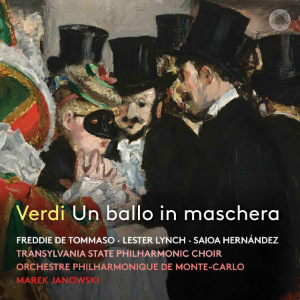
Giuseppe Verdi (1813-1901)
Un ballo in maschera (1859)
Riccardo, Count of Warwick and Governor of Boston: Freddie De Tommaso (tenor); Renato, his secretary: Lester Lynch (baritone); Amelia, Renato’s wife: Saioa Hernández (soprano)
Transylvania State Philharmonic Choir
Orchestre Philharmonique de Monte-Carlo/Marek Janowski
rec. 2021, Auditorium Rainier III, Monte-Carlo, Monaco; Radio Studio of Radio Cluj, Romania (choir parts)
Italian libretto with English translation.
Pentatone PTC5187048 [2 CDs: 131]
My colleague Göran Forsling has already admiringly reviewed this new recording of this, one of Verdi’s best “middle period” operas. He provides a brief survey of the classic recordings and I am entirely agreement with him that the 1966 Leinsdorf version remains pre-eminent. In my survey of this opera, I remarked, “This was the first LP box set of opera I ever bought and I am imprinted with it, hence I am unable to assess it objectively but I think I was fortunate in my random choice, insofar as I remain convinced that it features the best exponents of every role, from the five principal singers down to the comprimario roles sung by such as Piero De Palma” and it duly emerged as my first choice recommendation.
I must immediately confess that I am much less impressed by this new account of the later version, which in desperation was set in Boston rather than Sweden in order to avoid the censor’s wrath. It has many obvious virtues but my immediate response on first listening to it was that it lacks the drive and sparkle I hear in the Leinsdorf recording, despite Janowski’s brisk tempi. Quite often, it sounds more rushed than tense. My second reaction centres on what any of my regular readers will recognise as one of my hobby-horses: excessive vibrato. Not every singer evinces that failing but certainly I find it to be particularly evident in the baritone of Lester Lynch and the lyric-soprano Annika Gerhards’ Oscar. Furthermore, no voice has that intangible individuality and star-quality so recognisable yet hard to define; the principal singer who comes nearest to having it is Freddie De Tommaso, yet I do not find his husky timbre and little glottal catch when he takes high notes especially alluring compared with the likes of Bergonzi, Pavarotti and Domingo. There isn’t much velvet in his hoarse-sounding “Di’ tu se fedele” but he finds a welcome chuckle in tone for “È scherzo od è follia” and his stentorian top notes are quite impressive. His biggest scene is the fifth of Act II when he must sign the document ordering Renato and Amelia to return to England and he certainly makes a success of it, even if I do not hear enough pharyngeal ring in his voice nor the kind of plangent beauty Carreras or Pavarotti produce.
Lester Lynch makes heavy weather of his arias when one has the silky, resonant timbre of the likes of Merrill, Milnes or Zanasi in mind. His voice lacks tonal centre and pulses uncomfortably; he injects his big moment, “Eri tu”, with considerable rage, pain and disgust but the pulsing and lack of bronze resonance vitiate its effect. One may search in vain in lines such as “O dolcezze perdute!” for the kind of smooth legato we find in Cappuccilli’s version. Elisabeth Kulman has a large, fruity mezzo-soprano with plenty of contralto heft, but is a rather stolid singer. Saioa Hernández’s voice is similarly ample, but while her high, loud notes are really – almost disproportionately – huge – indeed close to shrieked – its mid-range is weak, unsteady, gusty and inclined to flap and her lower register is cloudy. I fear that she sometimes sounds very ordinary alongside some of her distinguished predecessors like Leontyne Price or Martina Arroyo. Nonetheless, she and De Tommaso work up a head of steam in their Act II duet under the gibbet. Annika Gerhards as Oscar has little of the vocal charm of Reri Grist, Kathleen Battle or Sumi Jo; her top notes are shrill – a case of “more needle than thread” – and as I remark above, her line is disturbed by too many oscillations in her tone. The one voice which made me sit up was American bass-baritone Kevin Short in the relatively minor role of Samuel, one of the two villainous conspirators; his rich, dark, resonant sound cuts through the orchestral textures.
This is the constant dilemma for the crusty collector, spoiled by familiarity with classic recordings. I always want to welcome a new recording of a complete opera, especially as studio versions are now comparatively rare events, but in no way does this new recording displace its illustrious predecessors except in terms of the clarity of its digital sound. It is neatly packaged in a cardboard clamshell box and the booklet contains a full Italian libretto and English translation – but the choice of illustrations – blow-ups from Manet’s “Masked Ball at the Opera”- adorning the box and booklet is oddly inappropriate as despite the painting’s title, the sophisticated Parisian world depicted there is far removed from the 17C Boston of the version sung here – or, for that matter, late 18C Stockholm.
Ralph Moore
Previous review: Göran Forsling (June 2023)
Help us financially by purchasing from



Other cast
Samuel: Kevin Short (bass-baritone); Tom: Adam Lau (bass); Ulrica: Elisabeth Kulman (contralto); Oscar: Annika Gerhards (soprano); Silvano: Jean-Luc Ballestra (baritone); Il primo Giudice/Un Servo d’Amelia: Samy Camps (tenor)


















